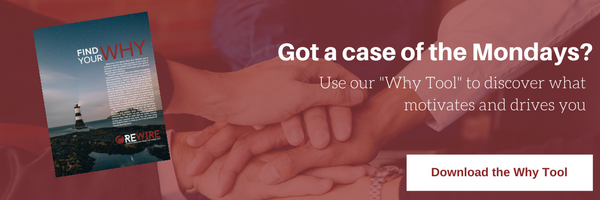
As I work with people, one recommendation I’ve seen pay dividends regardless of job title is to stay curious. Whether you’re a CEO or janitor, in operations or sales, following this axiom will keep you growing and connecting — both with your work and with the people around you.
At Rewire, one thing we stay curious about is motivation and the human brain. And whether we’re talking about motivation theories or Barry Schwatz’s Paradox of Choice, the recurring theme is that freedom of choice is crucial. The brain seems to be more inclined to rewire (commonly referred to as “neuroplasticity”) and take action when it is freed to do so as opposed to when it is forced to do so.
Here’s one application of that theme of freedom:
Let’s say, for grins and giggles, you awaken every day and before becoming fully conscious you begin to think about all of the things you HAVE to do today. In fact, you find yourself thinking that you “have to” do this and you “have to” do that… follow up on e-mail, make a call, and of course, go work out. In more common vernacular, we say to ourselves “I gotta do it.” And thus, before our feet have even hit the floor, we’ve already blocked ourselves off from motivation that would help us take action on the items we’ve been thinking about.
Or, let’s imagine for a minute that I were to come into your bedroom every morning and serve as your alarm clock by announcing that you “gotta” go work out. We both know that, given a comfortable bed in a dark room, you would resist this “command” from me (in addition to kicking me out of your bedroom and investing in new locks for your house). What’s more, my “gotta” would likely become a reason for you not to work out – if for no other reason than to spite me (the rude intruder).
But here’s the insidious part of all this: When we use language like “got to,” we become our own internal rude intruder. The language we use to frame our experiences has a profound impact on our thinking... which then influences our actions.... which then further influences our language and thinking about our experiences... and so on.
In pop psychology, this is referred to as "self-talk." And though I have a healthy skepticism of pop psychology, psychologists recognize the impact that self-talk has on our moods, actions, and overall health. But don't take my word for it: you can run your own experiment by catching yourself saying “got to” and change to “get to.” Try substituting "get to" in the following phrases:
- I get to work out today.
- I get to go to my job.
- I get to make that call.
- I get to ____________.
Changing your “got to” to “get to” may not be easy, but it will make a substantial difference in what you actually accomplish. Our mindset coaches are highly skilled at changing the "got tos" in your life to the "get tos". Freedom works at so many levels, and now we know it works at the thinking/cognition level, too. Would love to hear about your "get to's" in the comment section.




